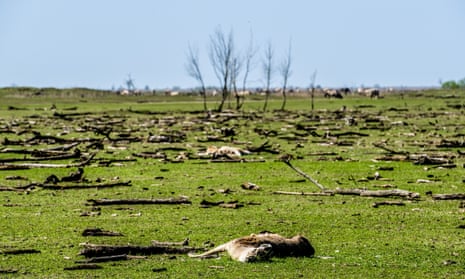Tennessee Judges Declare Warrantless Searches on Private Land Unconstitutional
BY Herschel SmithA recent court ruling in Tennessee restricts some of the powers that the state’s game wardens have traditionally held when policing hunters and anglers on private land. According to that ruling, which was handed down by a Court of Appeals on Thursday, wildlife officers can no longer enter private property to monitor, look for, or otherwise investigate wildlife crimes without a warrant.
[ … ]
These powers are summarized in a Tennessee law that allows officers with the Tennessee Wildlife Resources Agency “to go upon any property, outside of buildings, posted or otherwise” in order to enforce wildlife laws.
In its unanimous decision, a panel of three judges determined that the state’s game wardens were taking these powers too far, and that the current statute allowing for warrantless searches on posted private property is unconstitutional as applied by TWRA. The judges even drew comparisons between TWRA’s past actions and the tyrannies colonial Americans were subjected to under British rule.
“The TWRA searches, which it claims are reasonable, bear a marked resemblance to the arbitrary discretionary entries of customs officials more than two centuries ago in colonial Boston,” the judges wrote in their decision. “The TWRA’s contention is a disturbing assertion of power on behalf of the government that stands contrary to the foundations of the search protections against arbitrary governmental intrusions in the American legal tradition, generally, and in Tennessee, specifically.”
The decision stems from a lawsuit filed in Benton County Circuit Court by two Tennessee landowners, Terry Rainwaters and Hunter Hollingsworth …
The defense cites the so-called open fields doctrine, of course.
In defending the agency’s actions, attorneys representing TWRA argued that because so much hunting takes place on private land in Tennessee, officers would be unable to protect the state’s wildlife resources if they couldn’t patrol these lands. They also cited the “Open Fields Doctrine,” a federal precedent set during the Prohibition era …
That’s a great point. The open fields doctrine which comes from Hester v. The U.S., where it was held that these intrusions don’t violate the fourth or fifth amendments.
1. In a prosecution for concealing spirits, admission of testimony of revenue officers as to finding moonshine whiskey in a broken jug and other vessels near the house where the defendant resided and as to suspicious occurrences in that vicinity at the time of their visit, held not violative of the Fourth or Fifth Amendments, even though the witnesses held no warrant and were trespassers on the land, the matters attested being merely acts and disclosures of defendant and his associates outside the house. P. 265 U. S. 58.
2. The protection accorded by the Fourth Amendment to the people in their “persons, houses, papers, and effects,” does not extend to open fields.
Affirmed.
This case occurred in the western district of South Carolina.
Isn’t that special? The revenuers wanted to collect money from untaxed liquor, so the Supreme Court held that they can go on a man’s private property.
That is now used as a pretext for game officers invading a man’s property and installing cameras, walking around, or doing essentially whatever they want to.
The main point here isn’t what’s happening to game on the land. The main point is that these powers have been given to game officers and tax collectors. The main question is this: do you want game officers with that much freedom and control over you or anyone else? If so, perhaps we should grant police the power to ignore the constitution in all other cases. After all, what’s the difference between untaxed liquor and game animals and any other thing? Just apply the open fields doctrine to everything, everywhere.
Because money. It belongs to the king. And only the king’s men can hunt the royal forests – or those who pay him. All lands are the royal forests.
Except now in Tennessee, apparently.
Good.




